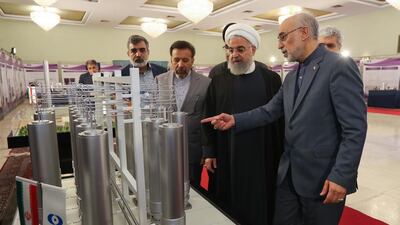Iranian officials said on Sunday that they would raise the enrichment of uranium beyond the limit agreed to in the 2015 nuclear deal with world powers, drawing warnings from all three European signatories to the agreement.
A week after it exceeded a cap on its stockpile of low-grade uranium, Iran will resume purifying uranium beyond the 3.67 per cent allowed under the agreement, Iranian government spokesman Ali Rabiei said in Tehran on Sunday.
Mr Rabiei said the move was under the orders of President Hassan Rouhani.
Deputy Foreign Minister Abbas Araghchi on Sunday said Iran's declining oil sales and the effect of financial sanctions needed to be resolved or Tehran would further step back from its nuclear commitments.
"We hope we can reach a solution, otherwise after 60 days we will take the third step as well," Mr Araghchi said.
He said that Tehran would give further details at an "opportune moment".
Under the pact, Iran can enrich uranium to 3.67 per cent, well below the 20 per cent it was reaching before the deal. Nuclear weapons require uranium enriched to about 90 per cent.
US Secretary of State Mike Pompeo showed no signs of backing down to Iran's threats.
"Iran's latest expansion of its nuclear programme will lead to further isolation and sanctions," Mr Pompeo said on Twitter.
"Nations should restore the longstanding standard of no enrichment for Iran's nuclear programme. Iran's regime, armed with nuclear weapons, would pose an even greater danger to the world."
The moves have created a challenge for European nations who helped to negotiate the deal but are struggling to deliver relief from US sanctions, which Tehran had demanded by July 7.
European leaders have signalled that they will not rush to impose penalties on Iran, but they will find it increasingly hard to resist pressure from the Trump administration if Tehran abandons more commitments.
French President Emmanuel Macron on Sunday condemned the Iranian decision to further enrich uranium, a move he called a "violation" of the agreement.
Mr Macron repeated the deadline of July 15 to resume talks between the parties, an official said, without elaborating on what would happen after that.
Germany, also a signatory to the nuclear deal, said it was "extremely concerned" by Iran's decision.
"We strongly urge Iran to stop and reverse all activities inconsistent with its commitments," the German Foreign Office said on Twitter.
Britain said it remained committed to the deal but that Tehran must "immediately stop and reverse all activities inconsistent with its obligations".
“We are co-ordinating with other participants regarding the next steps under the terms of the deal, including a joint commission,” a Foreign Office spokesman said on Sunday.
Israeli Prime Minister Benjamin Netanyahu called the Iranian announcement a "very dangerous step".
"This measure is a very dangerous step and I call on my friends, leaders of France, Britain, Germany," Mr Netanyahu said.
"You signed the deal and said the moment they took this measure, harsh sanctions would be imposed."
Inspectors from the UN nuclear watchdog who are in Iran will report when they have checked that Tehran has enriched uranium to a higher level of purity than that allowed under its nuclear deal.
"We are aware of Iran's announcement related to its uranium enrichment level," a spokesman for the International Atomic Energy Agency said.
"IAEA inspectors in Iran will report to our headquarters as soon as they verify the announced development."
The US withdrew from the deal last year and reimposed sanctions on Iran’s economy and leaders, prompting Tehran to reduce compliance and fuelling concerns that the region was sliding towards war.
Some of the recent US sanctions on Iran have been designed to prevent it from complying fully with the terms of the nuclear deal and end uranium enrichment altogether.
In May, the US ended waivers allowing Iran to export excess levels of heavy water and exchange extra amounts of enriched uranium for raw uranium or yellow cake,.
Iran has already exceeded the agreed 300 kilogram limit on stockpiling low-enriched uranium.
The US has moved thousands of troops, an aircraft carrier, nuclear-capable B-52 bombers and advanced fighter jets to the Middle East.
Oil tanker attacks near the Strait of Hormuz, attacks by Iranian-backed rebels in Yemen on Saudi Arabia and Iran shooting down a US military drone have raised fears of a wider conflict.
In a last-minute diplomatic bid, Mr Macron spoke Mr Rouhani on Saturday, saying he was trying to find a way by July 15 to resume dialogue.
But hopes for saving the faltering deal appear increasingly dim, as tension between the US and Iran continues to rise.
Ali Velayati, a senior aide of supreme leader Ayatollah Ali Khamenei, said that increasing enrichment towards weapons-grade levels was “unanimously agreed upon by every component of the establishment".
Mr Velayati also referred to 5 per cent enrichment.
Under the nuclear accord, Iran agreed to enrich uranium to no more than 3.67 per cent. Iran denies it seeks nuclear weapons.
Iran stopped producing uranium enriched above 5 per cent in January 2014 amid negotiations for the deal.

